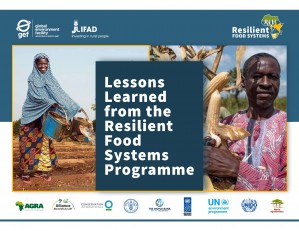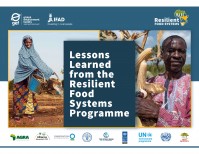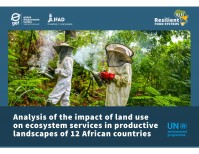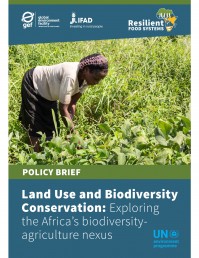The RFS programme is closing but food systems transformation carries on
22 June 2023
Knowledge & Learning is a cross-cutting theme incorporated into the design and implementation of each country project and is a key function of the Regional Hub. Activities that support Knowledge & Learning, or Knowledge Management, work to capture, analyse, and disseminate the cumulative knowledge and experience of each RFS project and programme as a whole.
When implementing large-scale development projects and programmes in the agriculture, natural resources, and environment sectors, Knowledge Management is often “treated as an afterthought”, according to the GEF Scientific and Technical Advisory Panel. The cumulative experience of a programme or organisation is an under-utilised resource that, if used correctly, could improve project impact, sustainability of project outcomes, and long-term capacity development.
Knowledge Management systems exist within resilience building projects and programmes, but often fail to be effectively embedded into project design and implementation. This shortcoming is both a product of and results in a lack of resources or expertise dedicated to Knowledge & Learning. Because Knowledge Management is not adequately formalised or incentivised, projects fail to capture and apply knowledge of what works and what doesn’t within adaptive management processes and within broader policy and decision-making processes.
Well designed and executed Knowledge Management systems that allow for frequent exchange of knowledge, documented learning and project adaptation can lead to transformational change. Ongoing Knowledge Management activities support RFS teams in translating evidence and project experience in to accessible products and tools that can feed into project design and implementation processes as well as decision-making and policymaking processes at the local-, national-, and continental-level. Making sure key stakeholders have the right information at the right time can improve the quality of decision-making and build efficiency both within and between projects.
By building Knowledge & Learning activities into each of the RFS country projects, RFS is contributing to growing Communities of Practice that operate within agriculture, natural resource management, and food security domains. Each of the RFS country projects operate within unique contexts, yet they all face common challenges. Communities of Practice capitalise on that commonality, connecting practitioners and stakeholders across countries and regions for peer-to-peer knowledge exchange, support, and collaboration.
Knowledge & Learning activities take place both within country projects and across the RFS programme as a whole. Within the programme, the Regional Hub is responsible for identifying, capturing, and disseminating knowledge for use and for learning for the country projects and external audiences. Through our Implementing Agencies, RFS offers an array of tools, methods and knowledge exchange approaches to connect country projects with each other and with the Regional Hub for support on implementation, filling information gaps and scaling-up learning. The Regional Hub develops knowledge products and tailors knowledge platforms, such as the Science-Policy Interface and the Resilience Atlas, to disseminate knowledge and key information and evidence to country projects in support of improved decision-making and project implementation.
The Regional Hub also organises South-South learning exchanges, annual workshops and webinars and cultivates relationships between country project for learning and collaboration. In May 2019, the RFS Uganda project team travelled to Kenya to see first-hand the technologies and approaches the RFS Kenya project is implementing to improve smallholder access to water and restore degraded riverbanks in the Upper Tana catchment. In March 2029, RFS project teams visited project sites in the Northern Ghana to learn how local farmers and communities are benefiting from Payment for Ecosystem Services, women’s empowerment and gender mainstreaming, Village Savings and Loans, and community engagement activities.
Explore the RFS Country Projects to see more examples of how RFS countries are implementing Knowledge & Learning activities.
Stories from the Field
Explore our stories from the field to learn more about how RFS country project teams are implementing activities related to the programmatic theme of Knowledge & Learning.
Relevant resources
We have a growing library of reports, briefs, case studies, media, tools and guidelines. Explore all resources related to Knowledge & Learning to get greater insight into our programme activities.


Integrated Approach Pilot (IAP) programmes were conceived as part of the Global Environment Facility (GEF) 2020 Strategy to test the delivery of integrated approaches that address discrete, timebound, complex, global environmental challenges. In its Sixth Replenishment Cycle (GEF6), three IAPs were funded: Sustainable Cities, Taking Deforestation out of Commodity Supply Chains, and Fostering Sustainability and Resilience for Food Security in Sub-Saharan Africa, also known as the Resilient Food Systems (RFS) programme.
The RFS programme serves as an outstanding example of different partners and countries with distinct mandates joining forces to pursue a shared objective, leveraging their respective strengths to transform food systems in Africa. It highlights the significance of clearly articulating the programme’s vision, establishing a well-defined division of labour, and delineating roles and responsibilities from the outset, forming the foundation for an accountability framework. Moreover, the RFS underscores the importance of adopting a nexus approach that integrates food security, agriculture, environment, socio-economic, and climate considerations.
This holistic approach recognizes the interconnectedness of these sectors and the need for holistic solutions. The RFS’s systems-based approach brings together multiple partners at different levels and fosters information flows in both directions, supporting collaboration and knowledge sharing.
This publication presents some of the main lessons learned from the RFS programme, which lasted for six years between 2017 and 2023. It provides a reflection on the implementation, lessons learned, and observations around the key components of the RFS. The programmatic value-add of the RFS and the manner with which it was harnessed during implementation is conveyed through case studies drawn from the experience of the country projects across these components.


This report explores the impact of changing land use on ecosystem services and productive landscapes in Africa. It has been developed under the Resilient Food Systems programme, one of three pilot programmes that form part of the Global Environment Facility’s sixth replenishment cycle (GEF-6). The Resilient Food Systems programme targets agroecological systems in the drylands of sub-Saharan Africa, where the need to enhance food security is directly linked to opportunities for generating local and global environmental benefits. Sub-Saharan African countries are seriously affected by environmental degradation and loss of ecosystems, resulting in persistently low crop and livestock productivity, as well as increased food insecurity for millions of smallholder farmers, with preponderant impacts on vulnerable groups such as women and youth.


This policy brief explores the nexus between agriculture and biodiversity within the broader context of land use change in Africa. It highlights key challenges for the continent as it seeks to ensure food and nutrition security and develop agro-industries, while at the same time protecting and restoring the region’s natural capital, including its biodiversity. The brief argues for closer collaboration between environmental and agriculture stakeholders in support of sustainable solutions to Africa’s challenges related to development, food security and nutrition, and biodiversity.